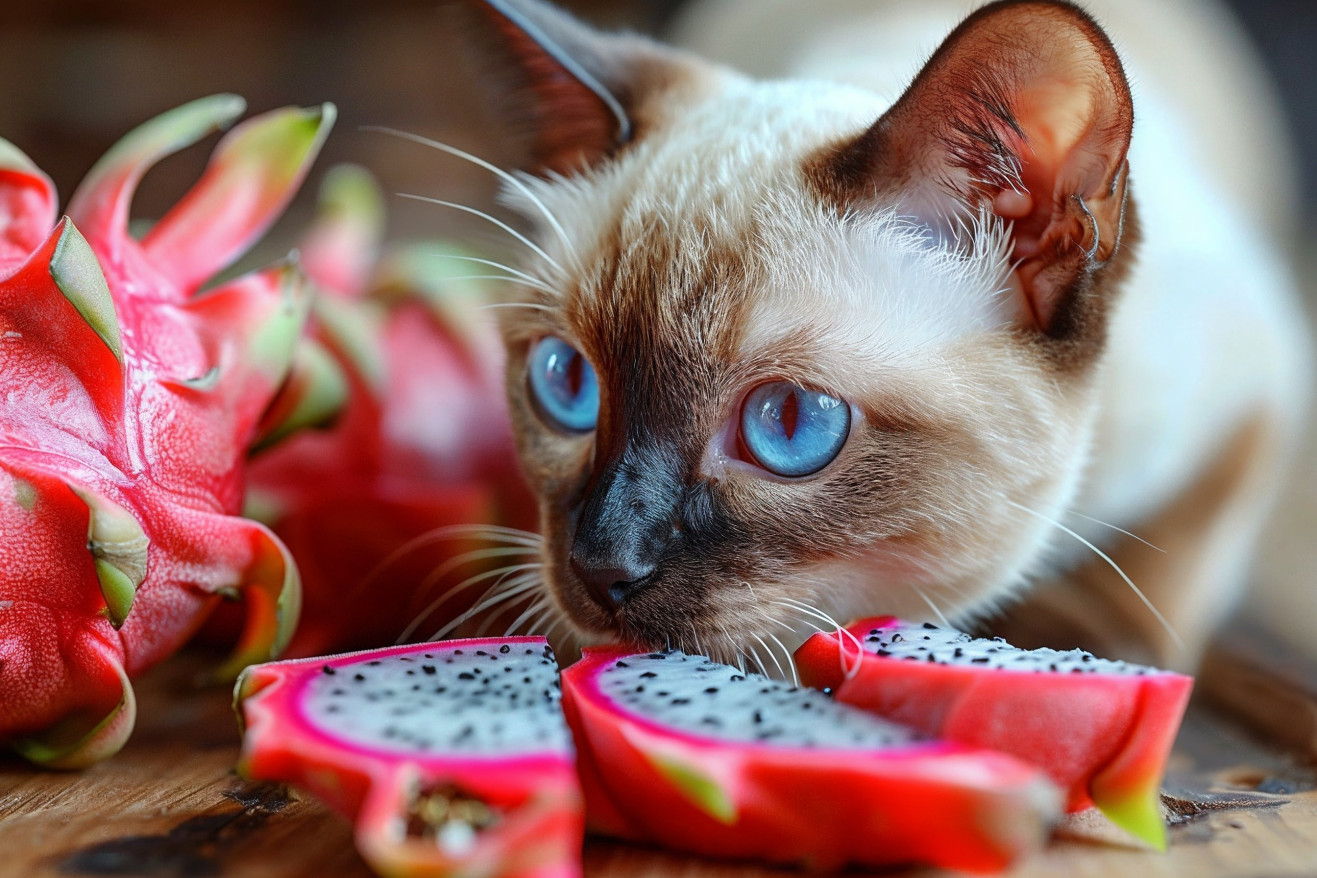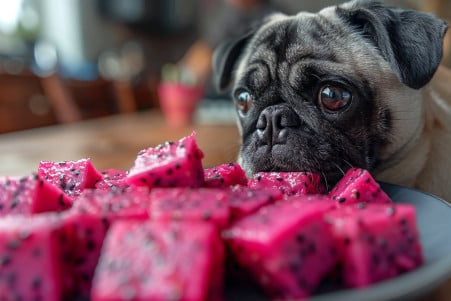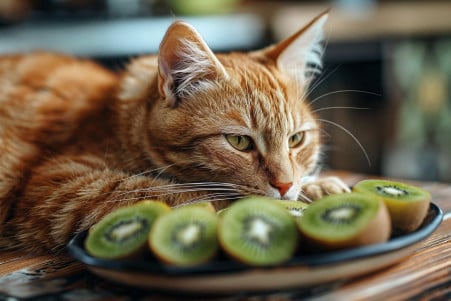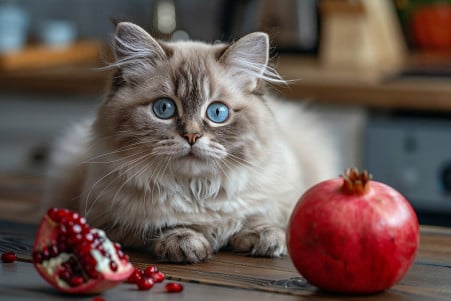Can Cats Eat Dragon Fruit? A Look at Benefits and Risks
22 April 2024 • Updated 21 April 2024

While dragon fruit may seem like a strange and foreign fruit, that doesn't mean that it's dangerous for your cat to eat. Cat parents can rest easy knowing that dragon fruit, also called pitaya, is not poisonous to cats and can be a healthy occasional treat in small amounts. The fruit's vitamins, minerals, fiber, and antioxidants can be good for cats. However, it's high in natural sugars, so it should be used as a supplement to your cat's regular diet, not a replacement.
We'll explore the advice of veterinarians and pet nutrition experts to get a better understanding of the potential benefits and drawbacks of giving dragon fruit to cats. This will help you make sure that this unusual addition to your cat's diet is safe and meets all of their nutritional requirements. You can also make sure that you're not putting your cat's health at risk by introducing them to new flavors by learning about portion control and how to tell if your cat is having a bad reaction.
Can cats eat dragon fruit?
Nutritional Composition and Digestibility
While dragon fruit is low in calories, it does contain a variety of nutrients such as phosphorus, magnesium, potassium, iron, copper, zinc, and vitamin A. However, since cats are obligate carnivores, they are not as well-equipped to digest and absorb the nutrients in dragon fruit as they are those in animal-based proteins. In addition, the fiber in dragon fruit can potentially lead to gastrointestinal upset, including diarrhea and vomiting, if consumed in large amounts.
Because of this, it’s important to feed dragon fruit to cats in moderation, as overconsumption can lead to gastrointestinal upset and even vitamin A toxicity. While dragon fruit does offer some nutritional benefits, cats should get most of their nutrition from a well-balanced meat-based diet, not fruit. Therefore, it’s best to think of dragon fruit as a treat that’s fed occasionally rather than a regular part of a cat’s diet in order to avoid potential health problems.
Potential Health Benefits and Risks
While dragon fruit can offer some benefits to cats, including hydration, antioxidants, and immune system support, the high water content in dragon fruit can also help increase hydration, which is important for kidney health and preventing urinary tract issues, according to Can Cats Eat Dragon Fruit? Benefits and Risks. The antioxidants in dragon fruit can also help fight free radicals and support a cat's immune system.
That said, Animals Around The Globe explains that overconsumption of dragon fruit can lead to negative side effects, including stomach upset, diarrhea, and allergic reactions in cats. Since cats are obligate carnivores, they need to get most of their nutrients from animal-based proteins, so dragon fruit should not be used to replace their regular, nutritionally complete diet. In fact, according to Your Pet Planet, while dragon fruit is not toxic to cats, it can be hard for cats to digest if they eat too much of it.
It's important to take precautions when feeding dragon fruit to your cat, including feeding it to them in moderation and talking to your vet before giving it to them, especially if your cat has any underlying health issues. If you take the right precautions, dragon fruit can be a healthy and safe occasional treat for your cat.
How to Prepare and Serve Dragon Fruit to Cats
If you decide to give your cat dragon fruit, it is important to make sure that you remove the seeds, as they can be a choking hazard. You can also make the fruit easier for your cat to eat by peeling it and cutting it into small pieces. In addition, you should opt for fresh, ripe dragon fruit and avoid unripe or processed fruit, as it may contain higher levels of toxins.
When you first start giving your cat dragon fruit, make sure to do so in small amounts so that you can watch for any negative side effects. In addition, as Animal Gator notes, you may want to try adding dragon fruit to homemade cat treats, which can be a fun and safe way to give your cat the occasional snack. This way, you can control the serving size and make sure that your cat is getting the new flavor in a way that is safe and enjoyable.
Special Cases for Certain Breeds and Health Issues
Although most cats can eat dragon fruit in small amounts as a treat, there are certain breeds or individual cats with dietary needs or sensitivities that may make it less of a good idea. Catster points out that cats with diabetes or obesity should avoid dragon fruit because of its sugar content, which can make these conditions worse.
In addition, Nord Exotic says that kittens and senior cats have more sensitive stomachs, which may make dragon fruit less of a good idea. Cats with pre-existing gastrointestinal problems or food allergies should check with a vet before introducing dragon fruit, according to Greg.app.
No matter your cat's age or health, it's important to watch their reaction after giving them dragon fruit. If you notice any negative side effects like vomiting, diarrhea, or allergic reactions, stop giving them dragon fruit and call your vet right away.
Conclusion: Moderation and Monitoring for Safe Dragon Fruit Treats
That said, dragon fruit can be a safe and occasional treat for most cats as long as it is fed in moderation. Although it does offer some nutritional value, it should not be used as a substitute for the animal-based proteins that should be the foundation of a cat's diet. In fact, because cats are obligate carnivores, they may not be able to digest and absorb the nutrients in dragon fruit as effectively as those in other foods.
Preparation is important, including removing the seeds, which can be a choking hazard, and cutting the fruit into small pieces that are easy for your cat to eat. In addition, the amount of dragon fruit you feed your cat should be limited, especially since the fiber in the fruit could potentially cause digestive upset if your cat eats too much. Overconsumption could also lead to gastrointestinal upset or vitamin A toxicity.
If your cat has specific dietary requirements or health issues, such as diabetes, obesity, or a sensitive stomach, you should talk to your vet before giving them dragon fruit. In general, it's also important to introduce dragon fruit to your cat's diet gradually and to watch for any signs of an adverse reaction. However, as long as you take these precautions, dragon fruit can be a fun way to introduce new flavors and textures to your cat's diet.


